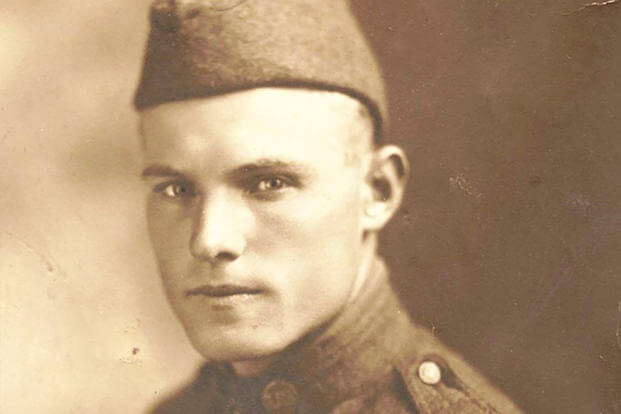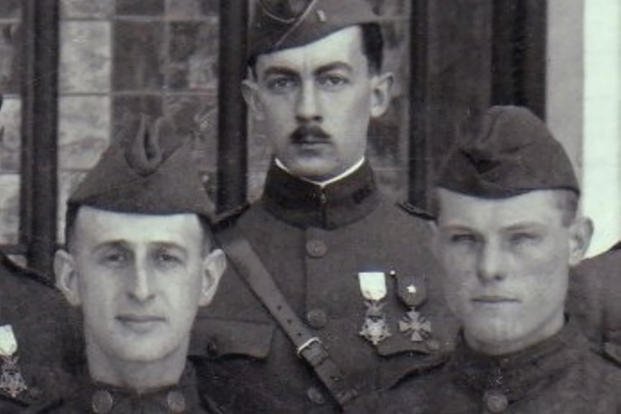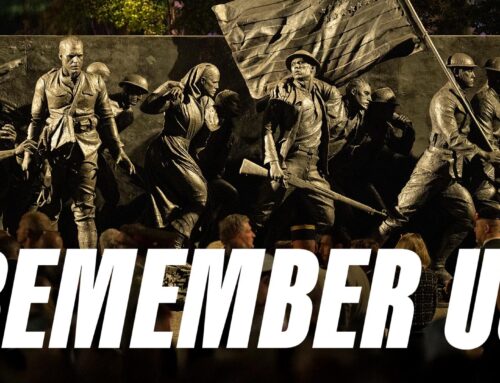This Soldier Was Born into a Life of Crime. Somehow, He Became a WWI Medal of Honor Recipient.
Published: 30 June 2025
By Stephen Ruiz
via the Military.com website

bargheadshot
Arrmy Pfc. Charles Barger was presented with the Medal of Honor for his actions during the Meuse-Argonne Offensive on Oct. 31, 1918.
Charles Barger’s life began under difficult circumstances and never really got any easier.
Born into a notorious Kansas crime family, Barger was put up for adoption when his father was imprisoned for murder, then was orphaned as a boy when his adoptive parents died. He quit school after the fourth grade and tried to support himself with farm jobs for a while before registering for the draft in 1917 — the year the United States entered World War I.
“The only constants in his life, it seemed, were hard work, poverty and loneliness,” retired Air Force Master Sgt. Joseph Bowman wrote in his 2018 book, “Quietly Exploding: The Life of Medal of Honor Hero Charles Barger.”
A distant nephew of Barger’s father, Bowman learned about him while researching his family’s genealogy. Charles’ grandson, Joseph A. Barger, and Chris Kraft, the soldier’s cousin, helped Bowman fill in myriad blanks, and what they discovered was incredible.
Barger’s birth parents were George and Cora Staffelbach. George’s mother, Nancy, ran a brothel, and along with her three sons, she often ran afoul of the law. The Staffelbachs started with petty offenses before graduating to more serious crimes, including murder. Their exact number of victims is unknown, but the Staffelbachs generally followed a familiar pattern: They would target a man visiting the brothel, rob and kill him, and dump his corpse down an abandoned mineshaft.

Private First Class Charles Barger, bottom right, is shown with fellow Medal of Honor recipients Donald Call, center, and Sydney Gumpertz.
The Staffelbachs’ reign of terror ended in 1897 when a stranger discovered a decomposed body floating in a mineshaft, according to “Quietly Exploding.” Nancy, George and another son, Ed, were convicted of the crime, and shortly after the trial, Cora divorced George and placed Charles up for adoption. The boy was either 3 or 4 when the Bargers — an elderly farm couple seeking help with chores more than someone to raise in a loving home — took him in. As soon as Charles was old enough, he worked nearly every day.
After the Bargers died, Charles was on his own. He stopped going to school and worked full time, but basic necessities usually eluded him. At least when he joined the Army, Barger didn’t have to worry about his next meal, where he would sleep at night or whether he would have enough clothes to wear.
Arriving in France in 1918, Barger became an automatic rifle gunner. It was not uncommon for the 24-year-old soldier to accept dangerous assignments such as going on fighting patrols or raiding parties, Bowman wrote in “Quietly Exploding.” Barger quickly revealed a fearless streak — one exemplified at St. Mihiel, when he volunteered to retrieve a dead soldier’s body. Barger not only successfully completed that mission, but also returned with five German POWs and two enemy machine guns.
→ Read the entire article on the Military.com website.
External Web Site Notice: This page contains information directly presented from an external source. The terms and conditions of this page may not be the same as those of this website. Click here to read the full disclaimer notice for external web sites. Thank you.



